Pick up and play: four tabletop RPG systems that are easy to learn (and aren’t D&D)
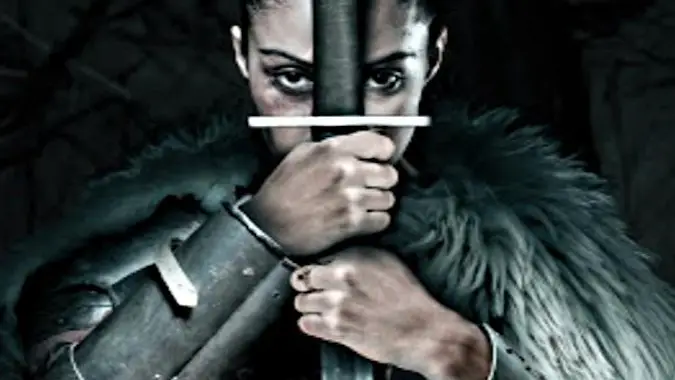
It’s no secret that sometimes when trying to convince people to give a tabletop RPG other than Dungeons & Dragons a try, one of the protests that often crops up is, “it’s too hard to learn new games!” To those of us already acquainted with other games, this seems ridiculous, but it’s worth examining: after all, if you’ve only learned the rules to one game, and that game is wildly complex from the get-go, what evidence do you have that every game isn’t like that?
Luckily, there are definitely lots of alternatives that — with a little leap of faith — can prove to be not just a fun break from the McDonald’s of RPGs, but also be familiar, fantastical, flexible, or even a little… flirty? Here’s a look at some tabletop RPGs that definitely above all are easy to pick up and play.
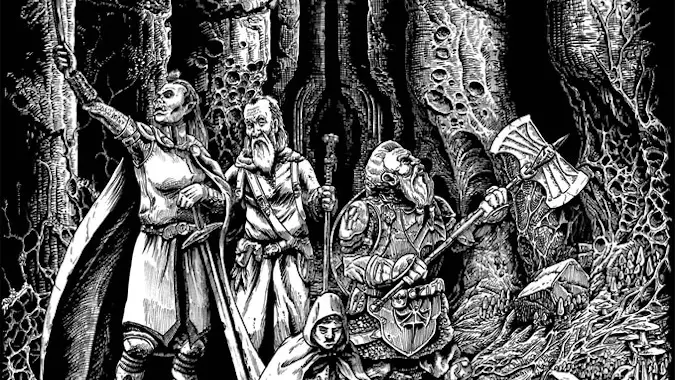
Shadowdark
I’ve already raved at length about Shadowdark, both in a prior article and on Tavern Watch, and I am not exaggerating when I say that when it comes to D&D-alikes, Shadowdark might be my #1 favorite game right now. It’s just familiar enough that if you know the gist of D&D you’ll inherently grasp a lot of the rules of Shadowdark, but it pares down or shaves off so many time-consuming elements of the ampersand game — especially as it pertains to combat.
The core mechanic is familiar: roll d20, add modifiers, try to beat a target number. But gone are an entire list of skills of which maybe 6 see common use (especially looking at you, Perception and Insight). No longer do you need to look at your character sheet to see which of the actual pages of combat options is relevant! Waiting for your turn almost becomes a thing of the past. It’s fast, it’s exciting, and if you’re worried it’s a little too gritty for your tastes, don’t worry — there’s a page of rules alterations to change the tone of the game to match what you’re looking for!
Next time you’re thinking specifically of trying to start a game of D&D, definitely consider instead giving Shadowdark a look. That player who tends to zone out and look at their phone during combat will thank you. Shadowdark is available in print and/or PDF from The Arcane Library.
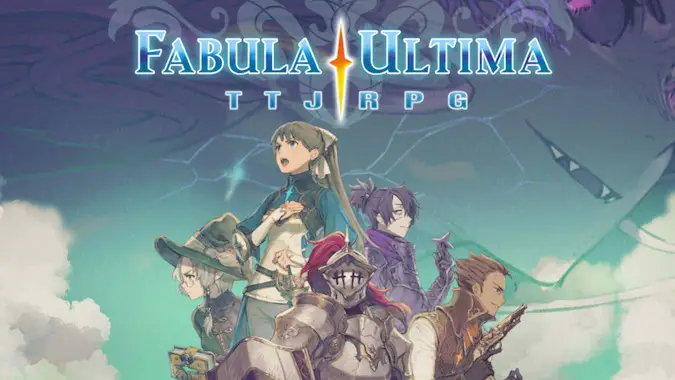
Fabula Ultima
It’s not a stretch to say that if you’re reading this on Blizzard Watch, you’re probably a fan of video games, as well as TTRPGs. If you’ve been hankering for something that’s not hard to learn and creates a feeling maybe a bit closer to what you’d expect from a Final Fantasy or Legend of Heroes game, I heartily recommend Fabula Ultima. Fabula Ultima bills itself as a “TTJRPG” — that is, a tabletop Japanese roleplaying game — and emulates something maybe even a bit more high stakes and exciting than your usual D&D game.
The character creation is a bit crunchier than something like Shadowdark, but much more flexible than something like D&D; if you’re a fan of multiclassing to tweak your build just so, you’re going to love Fabula Ultima. Right from the start you’re combining ranks of various video game RPG archetypes like healers, inventors, knights, and magicians of various stripes to create the ideal combo for you. Actual rolling involves grabbing a pair of dice — each one associated with one of your stats, from a d4 to a d12 — and trying to hit a target number, with traits you can invoke adding flexibility in the process. Combat also differs; instead of exact distances, Fabula Ultima (like Shadowdark) goes with ranges — in this case, evoking the front line/back line setup of a typical JRPG.
If that sounds like your cup of tea (or bright red healing potion), Fabula Ultima is available in print and digital formats from the Need Games website. (Bonus: if Fabula Ultima jives with you mechanically but you’re looking for something cozier, the so-called “pastoral fantasy” feel, then check out the actual Japanese TTRPG Fabula Ultima is mechanically based on, Ryuutama; it’s about the ordinary folk of a fantasy world going on a trip for various reasons — and the game master gets to play the dragon that secretly watches over them.)
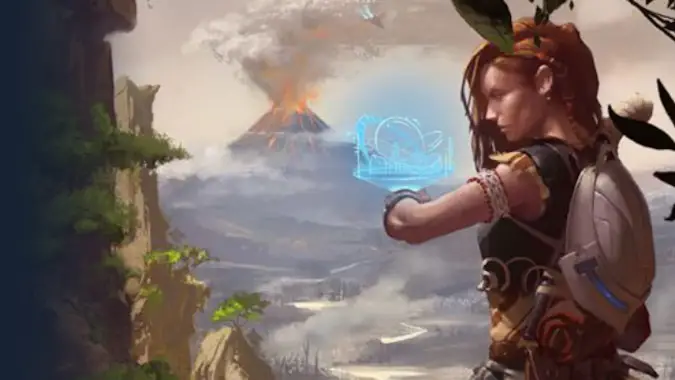
Savage Worlds
Maybe you’re trying to get away from fantasy, but you don’t want to muddle up D&D by adding a bunch of new untested rules and hacks to it. Or you do want to keep playing a fantasy tabletop RPG with a non-zero amount of crunch to sink your teeth into, but you want something more flexible, not constrained by classes and ancestries. How about a game that literally bills itself as fast, furious, and fun? Welcome to Savage Worlds.
Unlike most of the games on this list, Savage Worlds is a generic ruleset — which means by default, it’s not designed to emulate any genre, but offers rules for common elements of many games: dramatic tasks, chases, downtime interludes, and so on. The power sets are also generic enough to apply anywhere: is that blast power a wizard spell or a superhero’s eye beams? The answer is “yes,” it’s about flavor and effects. You can then tailor Savage Worlds to fit whatever your vision is, without the game making any assumptions on what you want to do in advance — either doing the work yourself to make the game fit the world you’re playing, or with the help of additional books offering everything from generic genre add-ons like the Super Powers Companion and Fantasy Companion, or specific settings like the weird west of Deadlands and gonzo future of Rifts. Heck, you can even play Pathfinder in Savage Worlds!
If you’d like to check out the wealth of material available for Savage Worlds, you can find absolute tons of it on Pinnacle Entertainment Group’s website.
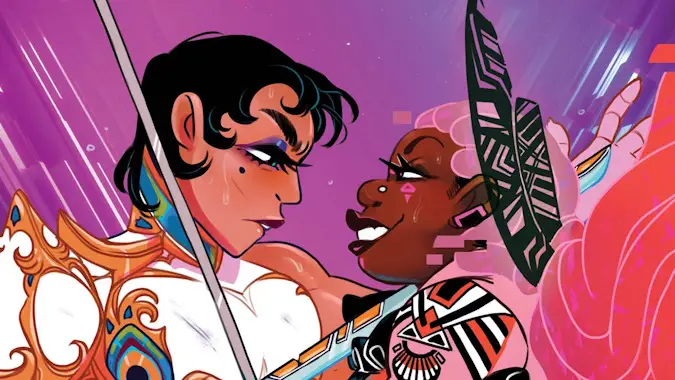
Thirsty Sword Lesbians
Maybe you like your swordfights to be charged with multiple types of tension. Maybe you want to play a game that explicitly emulates fighting to change an oppressive system. Maybe you just want a game that explicitly centers and celebrates queer joy and struggles alike, balancing narrative drama and player safety well. If so, you might be the target audience for Thirsty Sword Lesbians.
Rules-wise, this is probably the lightest of the games presented here; Thirsty Sword Lesbians is based on the Apocalypse World system, which generally involves rolling two six-sided dice, adding a number, and interpreting that on a spectrum from total failure to total success, with room in between for shades of both. Sometimes this gives people a panic attack who’re used to heavier games — where’s my extremely heavyweight character-building website full of options? — but just remember that games like this really bring roleplaying games back to their roots: they’re a conversation, a story we’re telling together, and sometimes at the right moments when we’re not sure what happens, we roll some dice.
In their own words, “A sword duel can end in kissing, a witch can gain her power by helping others find love, and an entire campaign can be built around wandering matchmakers flying from system to system. Thirsty Sword Lesbians is a roleplaying game for telling queer stories with friends. If you love angsty disaster lesbians with swords, you have come to the right place.” If that sounds appealing to you, then check out the Evil Hat Games website to pick up a copy for yourself.
Please consider supporting our Patreon!
Join the Discussion
Blizzard Watch is a safe space for all readers. By leaving comments on this site you agree to follow our commenting and community guidelines.




